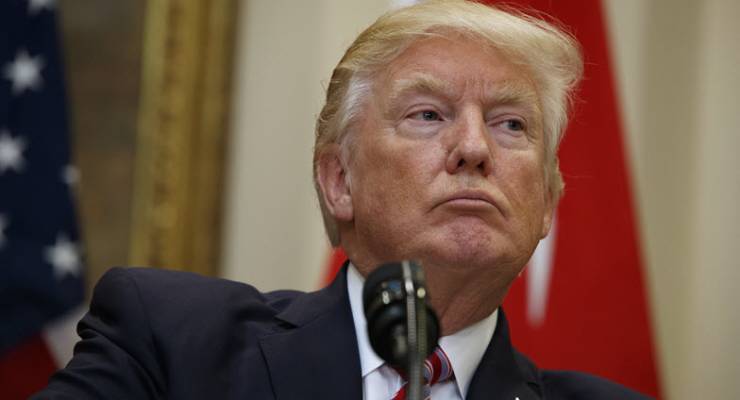
In a spirited defence of the ABC, Four Corners host Sarah Ferguson told the Melbourne Writers Festival that a strong public broadcaster is necessary for protecting Australia against the rise of a fractured media and society.
“Never in our history has the institution of public broadcasting been more important,” Ferguson opened in the John Button Oration for 2017, named after the former Labor minister in the Hawke and Keating governments.
In a wide-ranging address, which also covered her experiences interviewing former prime ministers Kevin Rudd and Julia Gillard, Ferguson criticised US President Donald Trump as failing in his response to the white supremacist violence in Charlottesville.
“Trump faced the first existential moment of his presidency and failed. He failed because of his refusal to condemn unambiguously the neo-Nazis and other white supremacists marching in Charlottesville.”
Ferguson linked the rise of Trump in the US with the fracturing of the media and the absence of a public broadcaster like the ABC: “Consider what might have been different in that country had it had, as a central pillar of its civil society, a well-funded national public broadcaster, an institution with the potential to bind together a country now at war with itself.”
A public broadcaster was needed to provide a space for differing views to be heard and shared without becoming hateful, Ferguson said, singling out Q&A as one such program, and referring to her work investigating the effects of domestic violence in Australia. She also recounted an experience covering a speech by Pauline Hanson in the early 2000s, when protesters made it impossible for the then MP’s speech to be heard. “Let her speak, I thought then. You have to listen — if you can’t allow the possibility she may have points to make, the divide between us widens.”
The rise of Hanson, and her hatred of the media, mirrors that of Trump, says Ferguson. “Now in her second coming, she echoes Trumps attacks on the media and in particular the ABC — for the moment refusing to appear on the ABC at all.”
Now Senator Pauline Hanson is trying to use cuts to the ABC as a bargaining chip with the government on media reform, with her senators claiming it is biased against the One Nation party.
While the ABC isn’t an antidote to all political or societal issues, its role in unifying the country and a place for debate was central to Ferguson’s thesis.
“We have seen some of the same fractures opening up here in Australia. The national broadcaster exists to balance them — a broadcaster that reaches into all regions, reflecting the whole country. It seems to me it plays a central unifying role. “
There was also thinly veiled reference to comments by commercial media bosses about the role of the ABC in the digital space. “Limiting the ABC in the digital world is a patent absurdity. As a national broadcaster, we must go where the public goes.”
Last month News Corp boss Michael Miller said the ABC was encroaching on the ability of commercial media companies to make a profit. “The ABC and SBS are becoming more and more aggressive commercial competitors who are determined to join the ranks of digital streaming services rather than meet the unmet needs of Australia, and particularly, regional Australia,” he said.
Ferguson made the case for both a strong public broadcaster and a digitally active one, warning that more Australians would feel “forgotten” if it is allowed to be targeted
“Donald Trump claims to speak for the forgotten Americans, there is some evidence that the statement is true. The ABCs job to make sure we hear them and see them. This has nothing to do with platform, it doesn’t matter how you read, hear or see this material as long as you do. “








Pauline Hanson was given free access to the News Cup media News Corp wanted her One Nation Senate votes to get media reform. The media reform fail to pass the Senate and News Corp’s strategy to take control of the Ten Network has left News Corp strabded. Hopefully rhis will also leave Pauline Hanson stranded as well.
Too late [for a strong ABC] we’ve already had Abbott.
Auntie’s foray into the digital world staggered and fell when they took down the Drum website and ceased allowing reader feedback, and it has not yet regained its feet…
Agreed. I don’t even look at it anymore.
Understand their current bind, copping criticism from all sides now for being too reactive defensive. But the essence of her speech is correct.
Because compared to the current cheap, shambolic state of the other networks, ABC offer a standard, are still producing quality – Ferguson’s baby, 4 corners, remains a standout. And the Drum is improving in potential, (now one of my regular views, could be longer).. their dramas, quirky comedies make commercial network efforts cringeworthy.
Just need to stop being defensive in the face of facile and deliberately destructive criticism.
Damn right Wallywonga
What the ABC (and we) really need, is more Sarah Ferguson’s.
Alas there’s only one of her.
But she still sets the gold standard for TV journalism.